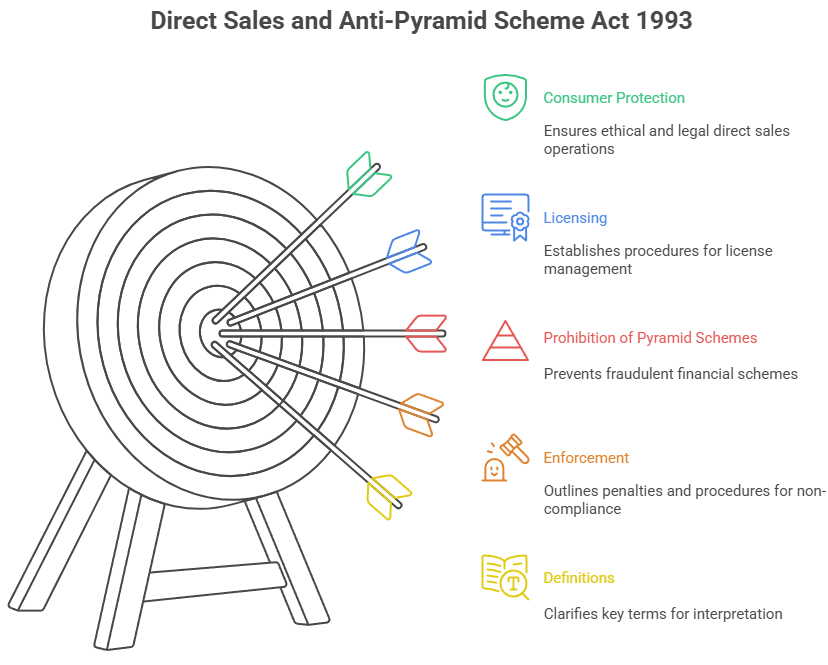Exercitation ullamco laboris nis aliquip sed conseqrure dolorn repreh deris ptate velit ecepteur duis.
- Level 7, Oasis Wing, Oasis Brunsfield Tower 3, No. 2, Jalan PJU 1A/7A, Oasis Damansara, 47301 Petaling Jaya, Selangor.
- +6011-6862 8823
The Direct Sales and Anti-Pyramid Scheme Act 1993
-
Network Marketing > Direct Sales MLM Business > The Direct Sales and Anti-Pyramid Scheme Act 1993
 Direct Sales MLM Business
Direct Sales MLM Business
The Direct Sales and Anti-Pyramid Scheme Act 1993
The “Direct Sales and Anti-Pyramid Scheme Act 1993″ provides a comprehensive overview of the legislation governing direct sales businesses and the prevention of pyramid schemes in Malaysia.
It outlines the scope of the Act, which applies throughout Malaysia and specifically regulates negotiations leading to the formation of direct sales contracts conducted after the Act’s enforcement.
The Act establishes the requirement for a license to carry on a direct sales business, with provisions for the submission, grant, refusal, revocation, and surrender of licenses. It also empowers the Controller to impose restrictions, conditions, or variations on licenses as necessary. The document details the procedures for appealing against the Controller’s decisions and the consequences of non-compliance with licensing regulations 3.
Furthermore, the Act prohibits pyramid schemes, chain distribution schemes, or similar arrangements, aiming to protect consumers from fraudulent schemes and ensure the ethical operation of direct sales businesses. It includes provisions for the forfeiture of property, documents, or computerized data seized in connection with offenses under the Act, with procedures for court orders and claims related to seized items 33.
The document also provides explanations for key terms used in the Act, such as “bonus or other benefits,” “material terms,” and the criteria for goods or services to be considered marketable under the specified features 42.
In summary, the “Direct Sales and Anti-Pyramid Scheme Act 1993” in Malaysia serves to regulate the direct sales industry, protect consumers from fraudulent schemes, and establish a framework for licensing and compliance within the sector. It outlines the legal requirements, penalties for non-compliance, and procedures for enforcement to ensure the integrity and legality of direct sales activities in the country.

What is the purpose of the Direct Sales and Anti-Pyramid Scheme Act 1993 in Malaysia?
The purpose of the Direct Sales and Anti-Pyramid Scheme Act 1993 in Malaysia is to provide for the licensing of persons engaged in direct sales business, regulate direct selling activities, prohibit pyramid schemes or arrangements, chain distribution schemes or arrangements, and any similar schemes or arrangements. The Act aims to protect consumers from fraudulent schemes and ensure that direct sales businesses operate ethically and legally 7.
How does one apply for a license to carry on a direct sales business under this Act?
To apply for a license to carry on a direct sales business under the Direct Sales and Anti-Pyramid Scheme Act 1993 in Malaysia, one must follow the procedure outlined in the Act. The steps typically involve submitting an application for a license to the Controller, who is responsible for granting or refusing the license 3. The Controller may impose conditions, restrictions, or variations on the license as deemed necessary. It is essential to comply with the requirements and regulations set forth in the Act to obtain and maintain a valid license for conducting direct sales business in Malaysia.
What are the consequences of not complying with the regulations outlined in this Act?
Failure to comply with the regulations outlined in the Direct Sales and Anti-Pyramid Scheme Act 1993 in Malaysia can result in various penalties and consequences. Individuals or entities found guilty of offenses under the Act may face fines, imprisonment, or both, depending on the severity of the violation. The penalties can range from fines not exceeding a certain amount to imprisonment for a specified term, with increased penalties for second or subsequent offenses 12, 36. Additionally, there are provisions for compounding offenses by paying a prescribed sum of money to avoid further legal proceedings 36.
It is crucial for direct sales businesses and individuals involved in such activities to adhere to the regulations stipulated in the Act to avoid legal repercussions and ensure compliance with the law.
Categories
- Compensation Plan (11)
- Direct Sales MLM Business (12)
- Licensing & Regulatory (10)
- MLM Software System (2)
